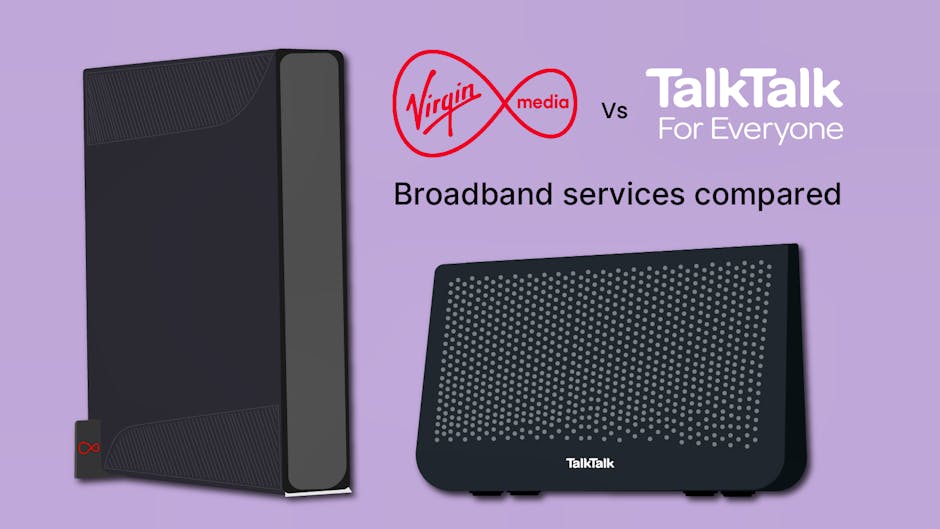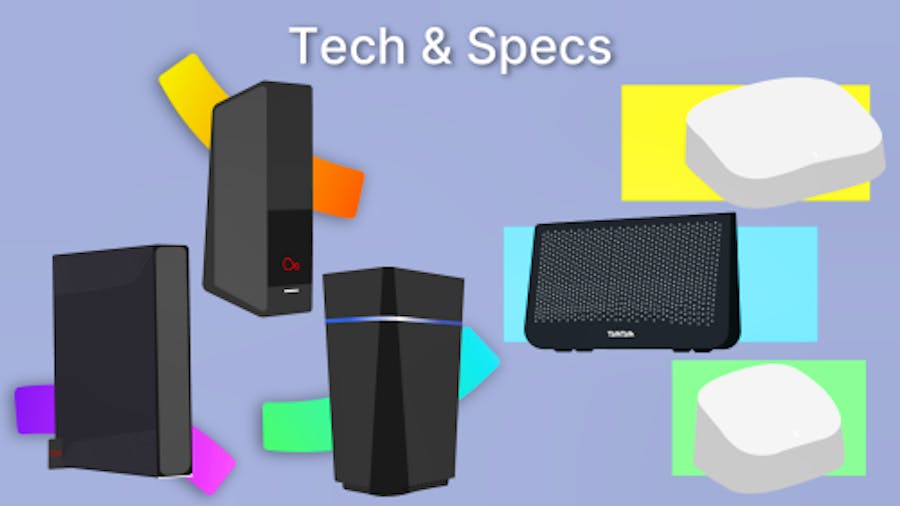TalkTalk vs Virgin Media | Broadband services compared
Two broadband heavyweights that pack a solid punch…

Choosing the right broadband provider for you isn’t always the simplest decision. With many great providers out there, each offering something unique to the others, there seems to be no wrong answer.
And there really isn’t. At the end of the day, it comes to what you think is best for you and your needs; whether that be high speeds for multiple connected devices or a reliable network to allow for more efficient home working.
Comparing the different providers isn’t always easy when just looking at the numbers and figures, so we’re here to help out by comparing two major players in the broadband world, TalkTalk and Virgin Media, and seeing how they match up with one another.
Again, this isn’t a right or wrong comparison, and spoiler warning but there is no winner at the end. This is simply explaining the two providers and what they do similarly and differently to one another.
TalkTalk vs Virgin Media: Network & Coverage
We’ll start with coverage as the first part of choosing your provider provider is checking what is available to you.
Fibre and full fibre are the two main connections available to you (there are other options like mobile or satellite broadband but we’re sticking to the most common two for now).
The difference between the two connections is down to how the broadband is supplied to the household. With fibre connections, fibre optic cable cables are run from the exchange to a roadside cabinet, then from the cabinet, a copper line is run to the household. Full fibre sees the fibre optic cables run from the exchange straight to your home.
Copper cables are slower than fibre optic ones, thus providing your home with lower speeds. Still, it’s better than ADSL which uses only copper cables.
However, full fibre isn’t as widely available in the UK as standard fibre just yet.
Full fibre networks are expanding as it is becoming the new standard in homes, just like how fibre replaced ADSL, but if you live in a more rural area, you may find that full fibre is yet to be installed.
Superfast fibre networks are available to 98.25% of UK properties, while ultrafast full fibre is currently sitting at 69.03%, but that number is growing at a steady rate.
TalkTalk
TalkTalk uses the openly available Openreach network, which operates across the nation and services many other providers.
So simply speaking, TalkTalk Broadband is available anywhere Openreach has its network, which is to say it is available to 99% of UK homes and businesses (a number stated by Openreach themselves).
Virgin Media
Virgin Media operates its own network, sort of like an AltNet but on a much grander scale, as Virgin Media’s network services over 53% of UK homes.
Technically speaking, Virgin Media’s full fibre isn’t the same as Openreach’s full-fibre as they use their own unique cabling technology that isn’t 100% fibre optic.
But because of this, their quickest speeds are the fastest widely available in the nation.
Virgin Media predominantly offer full-fibre connections, but that doesn’t mean that a town that’s a bit further out from a main city won’t be serviced with Virgin Media.
The benefit of running their own network is that they have full control over where and when it gets installed or serviced. It could be a case that while you may think your home is outside of Virgin Media’s operating range, they may just be able to connect it up.
That’s not to say they will every time, but it certainly could be a possibility.
TalkTalk vs Virgin Media: Speeds
Broadband speed is of course incredibly important these days, with many devices and servers requiring a certain minimum speed to operate, such as streaming content or playing online games.
Many UK providers have begun introducing the latest hyperfast full-fibre offering, gigabit broadband. This is broadband with incredibly fast speeds of 1000Mbps (1Gbps) or more.
TalkTalk and Virgin Media both offer Gigabit-capable broadband packages - or at least close to it in TalkTalk’s case.
Gigabit broadband is fantastic as it is more than enough for any household, capable of handling pretty much as many devices as you want/need while still providing a strong, reliable connection throughout.
However, as mentioned in the above section, full fibre isn’t available everywhere in the UK yet, and that especially goes for hyperfast gigabit-capable broadband, although the UK government has previously pledged that 85% of premises will have access to gigabit-capable broadband by 2025.
TalkTalk
TalkTalk offers six broadband speeds in total; two standard fibre and four full fibre. The packages and their average download speeds are:
- Fibre 35 – 38Mbps
- Fibre 65 – 67Mbps
- Full Fibre 65 – 77Mbps
- Full Fibre 150 – 152Mbps
- Full Fibre 500 – 525Mbps
- Full Fibre 900 – 944Mbps
Virgin Media
As mentioned before, Virgin Media’s network is predominantly full fibre. They have expanded their network so that any home on Virgin’s network has FTTP capabilities. The speeds available are:
- M125 Fibre – 132Mbps
- M250 Fibre – 264Mbps
- M350 Fibre – 362Mbps
- M500 Fibre – 516Mbps
- Gig1 Fibre – 1130Mbps
That doesn’t mean they don’t offer lower FTTC speeds, though. In today’s world, not everyone is in the financial position to afford full-fibre broadband.
Broadband is still a must, so for those on lower incomes, you can apply for Virgin Media’s Essential Broadband, which gives you three options:
- Essential Broadband – 15Mbps
- Essential Broadband Plus – 54Mbps
- Essential Broadband Plus with Stream – 54Mbps
All three come on a 30-day rolling contract so you can cancel whenever you want or need to.
The third option includes a Virgin Media Stream box, which allows you to get access to Virgin Media TV (extra one-off £20 setup fee required).
TalkTalk vs Virgin Media: Customer Service
When choosing a broadband provider, customer service quality can be as critical as the internet speeds and pricing. For many consumers, how issues are handled and the availability of support significantly influence their overall satisfaction.
In an ideal world, you don’t want to speak to any provider’s customer service because that means something isn’t working. But unfortunately, things can and do go wrong, and in those cases it's about the ease of contacting the provider and the speed at which they can help identify and fix your problem.
TalkTalk
TalkTalk admittedly doesn’t have the best past when it comes to customer service, but it is something they have worked on over the years.
There are multiple ways to get in contact with TalkTalk, including by phone, text relay, live chat, email or even by post.
TalkTalk has two main contact numbers that are specific to what you need; one number for talking to them about joining the provider, and one number for their customer service.
You can find these numbers and more information on how to get in touch via our TalkTalk phone number guide.
Virgin Media
Similar to TalkTalk, you can contact Virgin Media in several ways, including online via their live chat or over the phone.
Again, like TalkTalk, there are two main numbers to call, one for joining and information, and one for customer service. You can find both numbers and more in our Virgin Media contact numbers guide.
While a more negative note, it should be mentioned that Virgin Media doesn’t have the best reputation for customer service - in fact, Which? named them the worst major broadband provider for customer service.
TalkTalk vs Virgin Media: Tech & Specs

TalkTalk
A lot of the time, broadband providers will have their own WiFi hubs that they supply to their customers, something which they can have control over when creating them.
That’s not the way TalkTalk do things though, at least not with their full fibre offerings.
With Fibre 35 and Fibre 65, customers do receive the TalkTalk WiFi Hub. But for their full fibre options, they actually turn to the strong and reliable Amazon Eero 6 and Pro 6.
These hubs utilise the latest WiFi 6 technology and use mesh technology to enhance the range in the household to ensure no dead zones. You can also purchase extenders to help in the harder-to-reach rooms.
The Eero 6 is used for the Full Fibre 65 and Full Fibre 150, while the Eero Pro 6 and its advanced gigabit-capable technology is used for the Full Fibre 500 and Full Fibre 900.
Virgin Media
Virgin Media has four hubs available for their range of broadband. Each one provides their high-speed WiFi, gigabit Ethernet and support for WiFi 5 or 6.
The four hubs available are:
- Virgin Media Hub 3
- Virgin Media Hub 4
- Virgin Media Hub 5
- Virgin Media Hub 5x
All new customers for Gig1 Fibre will receive a Virgin Media Hub 5, with the 5x hub coming to all new FTTP customers in the future. The reason for this is that the Hub 5 comes with WiFi 6, the latest in WiFi technology, as opposed to WiFi 5 which is used on the Hub 4.
The Virgin Media Hub 3 is for customers who opt for the M125, M250, M350 and M500 packages. Here are the main specs for each hub:
Virgin Media Hub 3
Dual-band WiFi radio with 5 antennas, 2.4GHz and 5GHz, WiFi 5, 4x 1Gbps Ethernet ports. WPS & WiFi Pod compatibility as extras.
Virgin Media Hub 4
Dual-band WiFi radio with 7 antennas, 2.4GHz and 5GHz, WiFi 5, 4x 1Gbps Ethernet ports. WPS & WiFi Pod compatibility as extras.
Virgin Media Hub 5
Dual-band WiFi radio with 7 antennas, 2.4GHz and 5GHz, WiFi 6, 3x 1Gbps Ethernet ports, 1x 2.5Gbps Ethernet port. WPS & WiFi Pod compatibility as extras.
Virgin Media Hub 5x
Dual-band WiFi radio with 7 antennas, 2.4GHz and 5GHz, WiFi 6, 3x 1Gbps Ethernet ports, 1x 10Gbps Ethernet port. WPS & WiFi Pod compatibility as extras.
TalkTalk vs Virgin Media: Pricing
When it comes to affordability, both TalkTalk and Virgin Media offer their services at reasonable prices - not the best amongst the other major providers but still not terrible.
TalkTalk
TalkTalk labels themselves as a great value broadband provider, and in fairness, they do offer their services at good prices.
They start from £26 a month for their entry package and go up to £39.95 for their fastest speeds, which is a very good price for gigabit broadband.
Here are the prices for each option as available on Broadband Finder*:
- Fibre 35 – £34.95 a month
- Fibre 65 – £28 a month
- Full Fibre 150 – £29 a month
- Full Fibre 500 – £39 a month
- Full Fibre 900 – £49
It should be noted that these prices will change in April as according to the yearly price increases. TalkTalk have already confirmed that the prices will increase each April by £3.
*Prices correct as of 22/08/2024.
Virgin Media
Virgin Media often runs fantastic deals, offering their services at a cut price. These deals typically run for a while, but some will be flash deals that last for a week or so.
These are the current prices of Virgin Media’s broadband only packages that are available on Broadband Finder*:
- M125 Fibre – £26.50
- M250 Fibre – £30.50
- M350 Fibre – £34.50
- M500 Fibre – £33.99
- Gig1 Fibre – £40.99
Like with TalkTalk and almost all major providers, Virgin Media’s monthly prices will increase in April. Unlike TalkTalk though, Virgin Media does not have a set amount they rise by, instead opting to increase prices by the Retail Price Index rate of inflation announced in February each year plus 3.9%.
*Prices correct as of 22/08/2024.
Find a Deal
Enter your postcode to see the latest offers in your area.
Latest News
Featured Guides
Broadband Speed Test
Find out whether you could be getting faster home broadband speeds. Our speed test will check your current broadband and let you compare with other speeds in your area.
Test your broadbandBroadband Usage Calculator
Answer a few quick questions and our broadband usage calculator will give you a data estimate for your household. Using this we'll recommend the best kind of deal for you.
Calculate.jpg)












